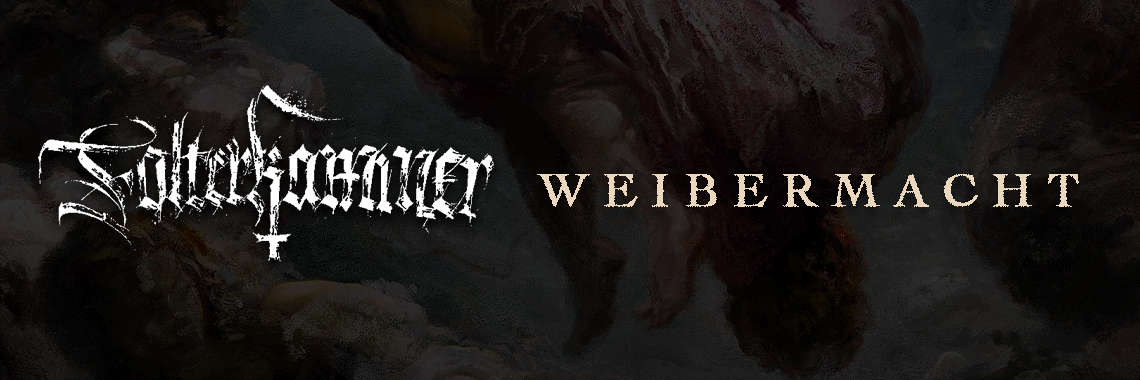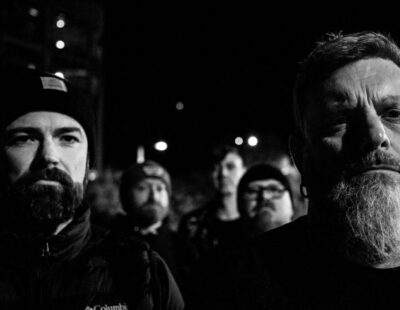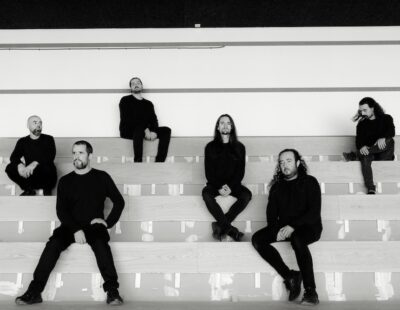
Vouna’s synth-laden, pastoral take on the often crushing and morose tenets of funeral doom is refreshing and enveloping in its naturalistic flow, folk-imbued textures, ethereal vocal melodies and black metal ambiance. We’re therefore delighted to bring you an exclusive premiere of “A Place to Rest,” the scene-setting opening track to the band’s self-titled debut. The song itself pulls the aforementioned disparate sounds together in cohesive fashion and should appeal as much to fans of Myrkur or Subrosa as it will to acolytes of Skepticism or Wolves in the Throne Room.
Speaking of the latter, Vouna’s first LP was recorded at WITTR’s Owl Lodge studio and will be released on 9 November through their label, Artemisia Records. But while Vouna share plenty of spiritual and sonic commonalities with WITTR, the vision of Yianna Bekris, the talented multi-instrumentalist behind the band and guitarist of the post-black metal collective Eigenlicht, remains distinctive due to her interesting array of inspirations.
“My primary influences I would say were Skepticism, My Dying Bride, fucked-up sounding lo-fi black metal, and Greek folk music,” she reveals. “My Dying Bride were the first doom band I ever loved. When I first heard them as a teenager, I was exclusively listening to death metal and didn’t understand why anyone would want to use clean singing for anything, ever. Something about the drama of the clean vocals mixed with their death metal riffs made it okay, though.”
Yianna doesn’t hesitate in telling us that funeral doom has become her favorite metal sub-genre. “I’ve overdone it on black metal at this point,” she says, “and funeral doom has the atmosphere and sorrow I crave so it’s now my source of mournful, atmospheric metal. Skepticism are a major influence in particular. I am infatuated with their decrepit, almost rotten synth sounds, and when I was shopping for a synth I was really looking for this type of sound. I found a rare Italian synth from the 1990s that’s designed for Middle Eastern music. That ended up having a profound impact on the record. It has a wonderful decayed quality and my exploration of the voices on this synth inspired me to write riffs that I never would have without it.”
“I’m also influenced by Greek folk music,” Yianna furthers. “This includes the modern genres of folk pop music that I grew up hearing because my dad was listening to it all the time. [Greek folk music] is similar to the mountains and trees of western Washington influencing me, it’s just in me and comes out in my music.”
You create all of Vouna’s music yourself, so what was the biggest challenge when it came to writing the material?
By far the biggest challenge was figuring out the right tempo for the music. While I was writing the songs, I would blast my demo over a PA and play drums to see if it felt right. I had to re-record my demos so many times because my [digital audio workstation] couldn’t change the tempo of my stems in a convincing way—so I would re-record the part, demo the drums, not be satisfied and repeat until I went crazy.
Conversely, what were the benefits you found of the solo approach?
One benefit to the solo approach for me is that I can very intentionally write and play each note on every instrument in the way that maximizes the impact of the music. I found the song-writing process liberating because I could be as meticulous as I wanted without frustrating any band-mates. Playing solo offered me the opportunity of total creative control, which felt essential in realizing the vision of Vouna.
Is your creative process much different when working on Vouna material as opposed to Eigenlicht?
It’s much, much different. Eigenlicht was a collaborative project, we would all bring riffs to the band and write the songs together—I would never just sit down and write a song for Eigenlicht. Vouna on the other hand has become very immersive for me. I lock myself in my house and trip out on riffs for days. When I can’t do that, I’ll sing the songs to myself in the woods while I’m working, driving around town, cooking. I get obsessive and the songs become some sort of evolving life-form that I’m culturing. I had to set a date for recording because otherwise I wouldn’t stop changing them.
You’re based in the Pacific Northwest. Those of us who do not live there but are fans of the metal bands from that region, have very romantic visions of the environment. How would you describe your surroundings, and how much impact did nature have upon Vouna’s debut?
The west-side of the Cascades is dark, wet and vividly green, with tall coniferous trees that grow like weeds. The mountains themselves are steep, rocky and rugged. We are surrounded by massive volcanoes that could erupt at any time. The Pacific Ocean is beautiful and grey, and in Olympia [Washington] you can feel the salt of the sea. It’s near impossible to not be reminded of the epic-ness of nature here. Unfortunately we have turned nature into a profit-making machine and are surrounded by “working forests.” The landscape is pock-marked with clear-cuts and strip malls. Olympia is near a huge military base. It’s still the United States.
I have always been fascinated with the juxtaposition of these giant swaths of wild-lands next to modern industrial society. The year I was born, old growth was still the largest source of timber here; they have since closed down the mills that could process trees that big because we cut them all down. I work doing forest ecology research so the industrial destruction of our forests is in my face all the time. I would say that although the beauty of pristine nature inspires me, this project is more an elegy on its disappearance; life and death, and things that were never alive, co-existing.
How did you meet the WITTR guys, and how did recording at their studio come about?
I’ve lived in Olympia for a long time, and it’s small enough that if you are into metal you will eventually meet every other metalhead that sticks around. I started working on this project around 2010, but I was always getting side-tracked by other bands. In 2016, there was a lull in my other projects, so I started playing around with Vouna again. Nathan [Weaver] told me he wanted to hear what I was working on so I sent him one of my demo tracks. He loved it and asked me how I was going to record it. For some reason I hadn’t really thought about having someone else record my solo music. Eventually that morphed into a conversation about me recording the album at the Owl Lodge. When it was done I was actually just going to release it myself on cassette, but they stopped me and asked if they could release it on their label.
Can you tell us a bit about the recording process itself? How were the sessions?
When WITTR told me they could help me record my album, they said I needed to find someone else to engineer the drums so I got my friend Ethan Camp who recorded the Eigenlicht album to do it. Nathan and Aaron [Weaver] were there for a lot of the drum recording, though. I told Ethan I wanted the drums to sound like Shape of Despair, and he nailed it. Aaron did the guitars, bass and vocals, Ethan came back and did the acoustic guitars and flute, and I laid down the synths. That was maybe a bad idea because there ended up being about 300 tracks of synths on the record…
You also collaborated with Nathan on the artwork. How important was his input?
Nathan’s input was extremely important, and I think it was a very successful collaboration. To add to your first question, another challenge of the solo approach for me is art. Some people start planning the album art before they even have a song written, but I was never one of those people. In a band I usually leave the art to my band-mates. Luckily Nathan volunteered to help me. I told him I wanted to pay homage to the art of funeral doom records from the 1990s and early 2000s, especially the cover of Evoken’s Quietus. We used imagery from Greek mythology because I’m Greek and grew up listening to Greek music, so it has a significant yet subtle influence on my music. Nathan and I created the concept together and Nathan laid out the art with the assistance of Chimere Noir who does a lot of the Artemisia layouts.
Inside you will find a photo of Spirit Lake in the blast zone of Mt. St. Helens, and you will also see a photo my band-mate Marrow took of me in a ghost town near Olympia. With the photo of Spirit Lake I wanted to visually portray the awesome power of nature. Spirit Lake once was a center of recreation, with a hotel and boats and everything. But Mt. St. Helens erupted and ended that in a matter of minutes. In fact, I hiked out to Spirit Lake just a couple months ago and it is still covered in downed logs from the eruption, 38 years later.
Thematically, then, is there an overarching concept at play?
The concept of the album is the experience of the last person on earth, or someone who believes they are the last person on earth. It’s a post-apocalyptic world where humans have died off and nature is reclaiming what once was.
Bolstered by those themes exploring our relationship with nature, some might say WITTR are a kindred spirit of Vouna’s. In fact, despite both bands’ stylistic approaches being different in ways, there are sonic similarities in the energy and atmosphere of the music. Would you agree with that?
I would definitely agree with that. I grew up close to the brothers in WITTR. They grew up here in Olympia, and I grew up in Seattle. Tahoma towers over both cities, and both are on the Puget Sound. Both cities are surrounded by coniferous forests and experience rain and overcast days for most of the year. Now I’ve lived in Olympia for over a decade, I’m closer to the forests and the mountains. It influences everyone who plays music here whether they like it or not. In addition, because they produced the album with me, they colored the atmosphere of the soundscapes with their sonic brushes.
We’re hosting the premiere of the opening track from your debut. Can you tell us what “A Place to Rest” is about specifically and why you thought it was essential, musically and sequentially, to frame it as the album opener?
This is the only song on the album which has a blast beat, and I thought starting a doom album off with a blast beat would add to the melancholy of the rest of the record. It is also the most black metal song on the album. The song is about someone being lost in the mountains during a storm, wandering for days looking for their love. Finally they come across their love, but they are in reality just hallucinating because they have hypothermia and are near death.
That’s very metal! Going back in time now, how did you get into metal in the first place? And how did you transition to more underground sounds and decide to pursue metal as an artistic endeavor?
I grew up in Seattle and when I was in middle school, I stumbled on this radio show called Metal Shop. I was already listening to grunge and industrial music, as well as Black Sabbath, but something about what I heard on that show really grabbed me in a way that music hadn’t before. They played all kinds of underground metal. I started tuning in every week and as soon as I figured out how, I was going to metal shows all the time. I traded my flute in for drums and I knew I had to play metal.
I bought a double bass pedal and started learning Carcass and Suffocation beats, soon after I was playing drums in shitty teenage death metal bands. Until I saw a local black metal band in full corpse paint. I was blown away by how otherworldly the experience was. I started writing black metal riffs on my acoustic guitar, but being a drummer I wasn’t that great at guitar and being broke, I couldn’t buy an amp. When I moved to Olympia, I met my dear friend Marit and we started Vradiazei as some sort of acoustic black metal band. She played viola, I played acoustic guitar, and we had a banjo player, too. We were labeled a neofolk band but we didn’t even know what that was. We wear corpsepaint to this day. That band got me a little attention as a guitarist and people started asking me to join their metal bands.
You’ve now assembled a live line-up in anticipation of the album’s release. Given the music you play, Roadburn could perhaps beckon at some stage! But what are your immediate aspirations for Vouna’s debut?
We would love to play Roadburn! And we would love to tour Europe. We’re planning a couple tours for this record in the US, if we could swing a Euro tour we would all be stoked. Honestly, the main aspiration for my debut was to finish it and record it. Now that I’ve done that, I feel like I can make a better record. Not that I don’t think this one is good, but it was a steep learning curve. So I’m working on another one now and I hope to start tracking by spring [2019].







